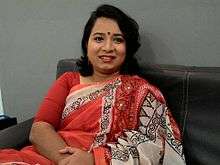Rokeya Lita
| Rokeya Lita | |
|---|---|
 Lita in April 2016 | |
| Native name | রোকেয়া লিটা |
| Born |
12 August 1985 Dinajpur, Bangladesh |
| Nationality | Bangladeshi |
| Alma mater | University of Liberal Arts Bangladesh |
| Occupation | novelist, journalist |
Rokeya Lita (born 12 August 1985) is a Bangladeshi novelist and journalist. She has written three novels.
Education and early life
Lita was born on 12 August 1985, in the northern part of Bangladesh, Dinajpur. Her father was a government employee and transferred to Dhaka. So she spent her childhood in Dhaka city and completed primary education in Dhaka. After retirement of her father, their entire family settled in Dinajpur. So, she grew up in a mixed cultural environment, both rural and urban. Her secondary and higher secondary education were completed in Dinajpur. Again she came back to Dhaka for her higher studies. She obtained her honors and master's degree from the University of Dhaka. She received her second master's degree from the University of Liberal Arts of Bangladesh. Rokeya Lita is the youngest child of her parents among four daughters.
Career
Lita started her career at the fortnightly magazine Anondo Alo by Impress Telefilm Publications. She also worked in Tarunkontho by The Daily Ittefak, banglanews24.com and Independent Television for a long time. Moreover, she worked in the Bangladesh Sanglap project of BBC. She writes columns regularly in different English and Bengali newspapers. Lita's first novel is Shomokameeta (Homosexuality), which was published by Agamee Prokashoni in the Ekushey Book Fair 2015. Her first novel was very controversial, since the theme of the novel is a kind of taboo in a Muslim populated country like Bangladesh.[1][2] The writer received a lot of threats from people of different groups. Her second novel Dumurer Phul (The Unseen Object) is published by Somoy Prokashon in Ekushey Book Fair 2016. In her second novel, the writer depicts the socio-political lives of indigenous people of different groups of the Chittagong Hill Tracts.[3] Though the political vulnerability of this area made some indigenous people protest against the writings of the novelist,[4][5][6] the writer has brought out some unknown facts regarding traditional indigenous laws, their flaws and impacts on the indigenous women.[7] She has published another novel named Purush (Men)[8][9][10] in the Ekushe Book Fair 2017. Currently, she is working on several projects, which include a novel on the Bangladesh Liberation War in 1971.
References
- ↑ "সমকামিতা নিয়ে লিখেছি বলে, অনেকে পতিতা বলে গালি দিয়েছে। | Kaler Kantho". www.kalerkantho.com. Retrieved 2017-02-20.
- ↑ নানা বিতর্কে রোকেয়া লিটা এর 'সমকামিতা'. Muhurter Khobor (in Bengali). 8 February 2015. Retrieved 25 April 2016.
- ↑ Shehab, Ahmed (11 March 2016). "Real story behind 'Dumurer Phul'". The Independent. Dhaka. Retrieved 25 April 2016.
- ↑ নিরাপত্তা চেয়ে জিডি করলেন লেখিকা রোকেয়া লিটা. Amader Shomoy (in Bengali). 10 February 2016. Retrieved 25 April 2016.
- ↑ "পার্বত্য জনপদ নিয়ে বই লিখে হুমকিতে লেখিকা". BBC বাংলা. Retrieved 2017-02-09.
- ↑ Narendra. "Progressive woman journalist received rape threats by tribals for her novel". Retrieved 2017-02-09.
- ↑ Rumi, G.M. (1 February 2016). ডুমুরের ফুলে বাস্তবতা তুলে এনেছি. Manab Zamin (in Bengali). Retrieved 25 April 2016.
- ↑ Kantho, Kaler. "'প্রেমিক চরিত্রের দ্বিমুখিতা,অসঙ্গতি তুলে ধরেছি' | কালের কণ্ঠ". Kalerkantho (in Bengali). Retrieved 2017-02-09.
- ↑ "নারীর আত্মহত্যাপ্রবণ ইচ্ছেগুলোকে দমন করবে যে বইটি | banglatribune.com". Bangla Tribune. Retrieved 2017-02-28.
- ↑ "প্রবাসে বসে 'পুরুষ' উপন্যাসটি লেখার অভিজ্ঞতা". bangla.bdnews24.com. Retrieved 2017-02-28.